Think of this as Volume 16, Number 36 of A-Clue.com, the online newsletter I've written since 1997. Enjoy.
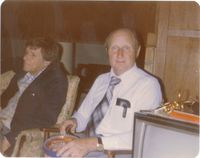
family project.
My wife wanted me to scan our old photos
into the computer, so they would be part of the screensaver that
plays over our family dinners.
Suddenly I was brought back into
another time. There was a rugged Texas clan holding a reception for
the kid who'd stolen their youngest daughter. Here was a California
family welcoming that daughter as an in-law.
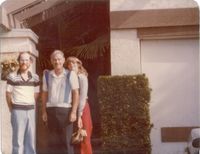
pulled irresistibly into these. Because I was in them. Or, a version
of me was in them, a younger version, a more naïve version, a
thinner version. (I'm on the left in this one. The man at the center is my dad, who passed in 1999, and next to him is my younger sister.)
I'd taken the daughter, and from that day to this she has been the love of my life.
Rather than fall into melancholia,
which my kids don't like to see, I thought it more useful to look at
the environment that young man moved in, and what's changed. So last
week my daughter and I drove down those Texas roads, toward the city of San Antonio where
that reception took place. Everyone in those pictures has since passed
away, save a few from my own generation, one of whom still lives in
that house on the hill.
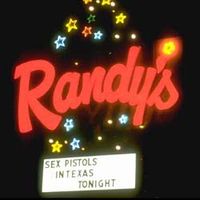
between that world and this than the differences. The road is the
same, the scenery the same, even the home is much the same, and the cars I passed aren't very
different in appearance. The city of San Antonio is a little bigger, with more big box stores than malls, and a lot more
diverse. But my late in-laws could have navigated it easily. It would
be home to them.
The differences lie beneath the
surface. This medium for instance. It's what I dreamed about and
talked about then. It's all here now. My dad died of
complications from hypertension caused by high cholesterol. I've
taken pills for a decade that are preventing that in me. There was a
lot of smoking in that society, and a serious generation gap. I wore
t-shirts then and wear them still, but none of the older generation
in those pictures did so – it was all button-down shirts and dress
slacks.
Then, I thought, those ruddy
middle-aged folks in those pictures were in their late 50s, the same
age I'm at now. What did their pasts look like?
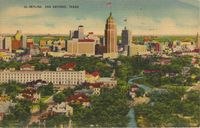
were no freeways in the early 1940s, not in that part of Texas. The
cars were smaller, they were very expensive, and most travel was by
train. There was no TV, only radio, and the word “cancer” meant a
death sentence. The music was completely different, and society's
attitudes were dominated by a global war that consumed the whole
generation. A young man of 23 then was an old man. Maybe he'd already
seen Guadacanal. Certainly he was waiting anxiously for D-Day.
And what of their parents? What of the
young society they had seen? What was south Texas like in the year
1900?
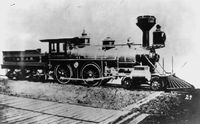
oil industry – not yet. You lived on the land and the
land either served you or you went hungry. Food was precious, leisure
short. Church was vital, and if you looked around you'd find Civil
War veterans, some of them newly-retired, still holding the old
grudges. Mexicans were foreigners, and doctors were quacks. Patent
medicines still ruled. The best you might hope for was to move to a
factory job. The Texas of 1900 had more in common with today's China
than the Texas of 2012.
The point here is that the nature of
change has shifted, in our time. Most change now lies under the
surface. We don't have the jet cars or the robot servants our
grandfathers drew in 1940s science fiction. Yet the present can
change, now, faster than some futurists can imagine it.
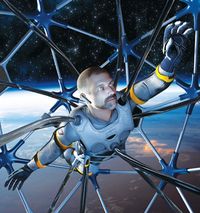
David Brin's latest novel, Existence. It takes place in the middle and toward the end of this century, and
extrapolates from many points of our time. Yet I noticed right away
that he still had cars that required drivers. I suspect driver-less
cars will be common by the end of this decade. Better and better
comes faster and faster indeed.
I spent time with my mother this
summer, and know it's unlikely I will see the universe Brin's latest
book describes. When that time comes, my kids will be about the age
that I am at now. But the trend seems clear – the physical changes
in our world are becoming smaller as we move forward, the larger
changes lie beneath the surface, in how we work, in how we live, in
the size and diversity of the world around us.
The Internet was the story of my life.
I believe the protection of the planet will be the story of my
childrens' lives. Unlike many people, I am optimistic that they are
up to the challenge. If I live to be 89, the age my mom is at now, I
think I will be well-pleased.
A larger point here is that we are all
time travelers. We are given some time here in our bodies. It may be
long, it may be short. We travel through it and do the best we can
with it, see as much as we can with it, and hope that we can push
things forward just a little bit for those who come after us. I know
now that I stand on the shoulders of my parents' generation, and my
children stand on my own. I voyage forward into a narrowing window,
as the world opens up for them. As it was in those old pictures for
my parents, so it is for me.
And I think to myself. What a wonderful
world.


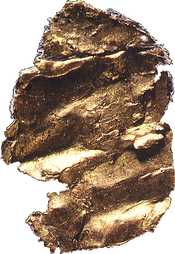








Ideas To Make Family Travelling Fun!
It is often really nice to have youngsters around. Their free-spirited nature and natural curiosity make for a particularly fun and enjoyable time. While this happens to be true, kids can make things really stressful when youre traveling. The pl…